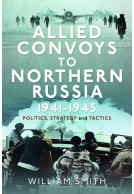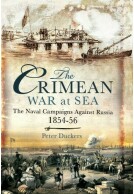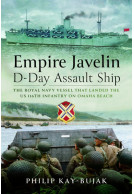Churchill's Arctic Convoys (Hardback)
Strength Triumphs Over Adversity
Imprint: Pen & Sword Maritime
Pages: 272
Illustrations: 40 mono
ISBN: 9781399072298
Published: 24th August 2022
New and Noteworthy!
April 2023 issue of WWII History Magazine
(click here for international delivery rates)
Order within the next 1 hour, 39 minutes to get your order processed the next working day!
Need a currency converter? Check XE.com for live rates
| Other formats available - Buy the Hardback and get the eBook for £1.99! | Price |
|---|---|
| Churchill's Arctic Convoys ePub (8.8 MB) Add to Basket | £6.99 |
The threat of Operation Barbarossa, Hitler’s surprise invasion of Russia in June 1941, succeeding prompted Churchill to decide to send vital military supplies to Britain’s new ally.
The early sailings to Northern Russia via the Arctic Ocean between August 1941 and February 1942 were largely unopposed. But this changed dramatically during the course of 1942 when German naval and air operations inflicted heavy losses on both merchantmen and their escorts. Problems were exacerbated by the need to divert Royal Navy warships to support the North African landing.
Strained Anglo-Soviet relations coupled with mounting losses and atrocious weather and sea conditions led to the near termination of the programme in early 1943. Again, competing operational priorities, namely the invasion of Sicily and preparations for D-Day, affected the convoy schedules. In the event, despite often crippling losses of lives, ships and supplies, the convoys continued until shortly before VE-Day.
This thoroughly researched and comprehensive account examines both the political, maritime and logistic aspects of the Arctic convoy campaign. Controversially it reveals that the losses of merchant vessels were significantly greater than hitherto understood.
While Churchill may not have described the convoys as ‘the worst journey in the world’, for the brave men who undertook he mission often at the cost of their lives, it most definitely was.
“This book is written in a concise but highly readable style. Themes covered in detail include vital information not usually reported on, like: communications, including mail service as well as radio; attempts to provide air cover based in Northern Russia, including fighters and torpedo bombers; and the treatment of Allied personnel, including sailors and aircrew.”
The Northern Mariner
As featured
Association of Royal Navy Officers Yearbook 2024
"This thoroughly researched and comprehensive account examines both the political, maritime and logistic aspects of the Arctic convoy campaign.
Shipping, Today & Yesterday - June 2024
I would highly recommend this book."
Overall, for an intermediate to Higher level briefing on the topic , this is pitched at exactly the right level for readers with some background on WWII War at Sea.
ARRSE (Army Rumour Service)
Warmly recommended - 4 Mister Mushroom Heads.
Read the full review here
Read the review here
The Nautilus Telegraph - May/June 2023
The book also notes the political, logistical, and maritime factors that affected the operations, including the Allied invasions of North Africa, Sicily, and Normandy that put a strain on the convoys and diverted the much-needed protection from Royal Navy warships.
Seapower
"It will be a useful reference to anyone researching in future."
South West Soundings, South West Maritime History Society
As featured on The Naval Review [/b]
Naval Review
Smith’s book highlights his strengths as a researcher of both sides of the Arctic battles and across naval surface and underwater, air, and merchant categories. His book is essentially a detailed, well-written log of the actions in the campaign with some useful observations on the battle as a whole.
The National Maritime Historical Society
"This is a very comprehensive history of these convoys with full details of every convoys and I would very highly recommend it to our readers."
Shipping - Today and Yesterday, December 2022
Featured by
South West Maritime History Society
This work covers the convoys in chronological order divided into the phases of the whole operation.
Martin Willoughby Wessex Branch WFA
The narrative is clear and very readable complimented with clear black & white plates many from the US Navy Heritage and History Command. Authors notes, bibliography, index and the particularly useful and detailed appendices mean this book is an especially useful contribution to the subject. William Smith has in my view brought a work of great interest to both the general and specialist reader.
I recommend this work to both.
"Churchill’s Arctic Convoys draws attention to the part played by merchant vessels and their brave crews."
Australian Naval Institute
As featured in a competition
The Armourer
There has been much written about the Allied convoys which battled back and forth across the Arctic Ocean between August 1941 and May 1945 to get vital military supplies to Russia. Some may consider there is little more to be said, however, in Churchill’s Arctic Convoys William Smith provides a very clear and useful chronological, and relatively brief, summary of every convoy. The text is supported by detailed tables noting the entire convoy sailing programme and Allied and Axis losses. William Smith has provided an extremely useful primer to the subject which will be of considerable interest and use to the general reader. Recommended.
Military Historical Society - November Bulletin 2022
This is a very well-written book, informative and I loved the statistical information and charts at the back of the book. A thoroughly good read on the subject, one I would happily recommend.
The History Fella
Read the Full Review Here
As featured on World War II Today
WW2 Today
The Arctic convoys tend to lie on the periphery of general reading about the Second World war William Smith’s book deserves to be front and centre if only to honour the men and women whose story he has told.
Clash of Steel
We highly recommend this book.
Read the full review here
Brilliant! This is easily my favourite read on naval warfare since Jonathan Dimbleby's excellent The Battle of the Atlantic. Whereas Dimbleby's book was an epic overview of an entire theatre of war, this zooms in on just one sub-theatre of the war at sea... Bill Smith does his subject a great service, rendering a very compelling and readable account of a fascinating subject.
Sebastian Palmer
This is a remarkable review which reflects considerable research into the Arctic convoys of WWII - an experience described by participants as the 'worst journey in the world'. Following a lull in German resistance to allied convoys to Russia, everything changed in 1942 when German attacks on these convoys became constant and deadly. Sailors not only faced severe attacks from German naval vessels but also from the Luftwaffe, frequently successful. They also had to cope with the fierce and numbing weather regularly experienced in the Arctic Ocean. These were conditions no man should have been expected to endure but this is what they did, and allied shipping losses were almost unacceptable; indeed, the book confirms allied losses were worse than previously published.
Dr Adrian Greaves, The Anglo-Zulu War Historical Society
This book is an eye-opener as well as being a remarkable read. It is brilliantly researched and supported by stunning photographs; the book is a credit to the author - as well as to all who participated.
Highly recommended.
About William Smith
William Smith is an Open University Honours Graduate and retired Civil Servant with forty-two years’ experience in Royal Naval, Joint Service and NATO logistics. He was seconded for four years to the US Navy liaising on Royal Naval weapon procurement programmes. He also attended the NATO Defence College in Rome.
Encouraged by his maternal grandfather’s Royal Navy service during the Great War and his father’s Second World War Merchant Navy experiences, for which he was decorated, Bill decided to research naval history during his retirement. This book is the result of his particular focus on the Atlantic and Arctic Theatres during the latter conflict. His Churchill’s Arctic Convoys was published by P&S in 2022.
He and his wife Valerie, who have a son, a daughter and three granddaughters, live in Wiltshire..

















